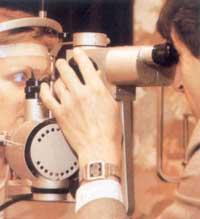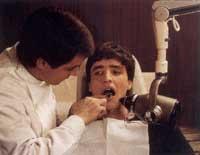Visit the doctor, when? and for what?
Text created by automatic translator Elia and has not been subsequently revised by translators. Elia Elhuyar
Even though your feeling toward the doctor is not very pleasant, you can't escape completely from his clutches, because from time to time you have to know if the body machinery works properly. How do we know if we are healthy? Thus, by controlling some figures, the observation of certain points and the periodic realization of simple studies and analysis. All this in summary form.
Weights and measures. Adequate figures Adequate figures
- Weight. Never weigh more than once a month. Always weigh on the same scale and at the same time every time. Except for special circumstances (treatments, operations, etc.) The weight must remain the same. Although fattening is not pleasant, it should not lose more than 4 kg per month for no apparent reason. In this case, visit the doctor.
 Although your feeling towards the doctor is not very pleasant, it is necessary to know if the body machinery works properly.
Although your feeling towards the doctor is not very pleasant, it is necessary to know if the body machinery works properly. - Blood pressure. If your doctor doesn't control tension every time you go, ask for it. The ideal figures for a 40-year-old are 14/8. Figures 16/9.5 or higher than that age are considered hypertensive and require treatment. On the contrary, the voltage equal to or below 11/6 is too low. The reasons can be many and different; you have to look for them. While hypertension walks quietly, hypotension is the one that produces visible disorders (dizziness, dizziness, etc. ). ), because the organ that highlights the lack of blood supply is the brain.
Sugars and fats
Be careful with excesses. If you are diabetic, limit treatment or intake. If you are fighting with cholesterol, in a next issue we will speak more calmly about this topic.
Blood tests Blood tests
 Blood count. It usually requests confirmation of some suspicious diagnosis. However, it is always convenient for women to have an approximate value. Have 4 million red blood cells per cubic millimeter of blood and know that men have one million more. The number of white blood cells ranges from 5,000 to 9,000 per mm3 to protect them from external attacks. Platelets, which control the fluidity of the blood, range between 250,000 and 400,000 per mm3. But do not worry if your figures do not match the normal ones! Blood is a very changing topic, which changes quickly by a flu or a stay on the mountain. Only the doctor can draw conclusions. If you are a woman and use some method of birth control, the doctor will ask for special tests every two years. If not, ask. The levels of sugars and fats in the blood should be especially taken care when taking contraceptives (pills), since normally levels rise and are risk factors (diabetes, arterosclerosis).
Blood count. It usually requests confirmation of some suspicious diagnosis. However, it is always convenient for women to have an approximate value. Have 4 million red blood cells per cubic millimeter of blood and know that men have one million more. The number of white blood cells ranges from 5,000 to 9,000 per mm3 to protect them from external attacks. Platelets, which control the fluidity of the blood, range between 250,000 and 400,000 per mm3. But do not worry if your figures do not match the normal ones! Blood is a very changing topic, which changes quickly by a flu or a stay on the mountain. Only the doctor can draw conclusions. If you are a woman and use some method of birth control, the doctor will ask for special tests every two years. If not, ask. The levels of sugars and fats in the blood should be especially taken care when taking contraceptives (pills), since normally levels rise and are risk factors (diabetes, arterosclerosis). Every five years, all family members should carry out the most common clinical studies. Morphological and functional study of the eyes and teeth is common.
Every five years, all family members should carry out the most common clinical studies. Morphological and functional study of the eyes and teeth is common.
General situation; periodic family control
- All. Every five years, all family members should perform the most common clinical studies; morphological (aspect) and functional study of the eyes, ears and teeth; control of the capacity and respiratory capacity; electrocardiogram, pulmonary radiography and blood tests. If an anomaly is detected, the specialist should be approached, hearing the opinion of the general practitioner.
- For the father, The prostate should be controlled from the age of 50. This disease remains silent, highlighting the symptoms very late. Prostate adenoma is completely benign, but the frequency of cancer increases by age.
- For the mother. A frotis (or Papanicolau with technical name) is essential every year. This medical control, which takes 5 minutes, aims to obtain, without pain, cells from the cervix for further laboratory analysis. Mammography (or X-ray of the breasts) is one of the easiest and safest ways to early detect gynecological diseases. Mammography (or x-ray of the breasts) is important from the age of 35 and should be done every 3 years, unless there is a family history of female cancer. In these cases control will be more frequent.
- For children. The eyes, ears (ear) and dentures are the three basic pillars of the child's periodic control. Vaccines are another fundamental pillar in the health of the child. Fortunately, today almost all countries are forced. If your case is so, go to pediatricians, who will be the one who establishes a vaccination schedule suitable for your children.





